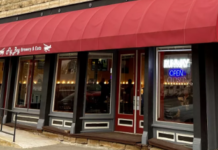From the Office of Public Affairs | http://www.news.ku.edu
Headlines
Editors: A map with the story shows survey participation from your area.
Contact: Carrie Caine, Institute for Policy & Social Research, 785-864-9102, [email protected]
Feedback sought from Kansas families to understand internet service gaps
LAWRENCE — Researchers at the University of Kansas Institute for Policy & Social Research aim to develop high-quality data on broadband affordability and access, and they need assistance from Kansans to understand internet priorities across the Sunflower State.
Through a series of surveys and focus groups, Donna Ginther, Roy A. Roberts Distinguished Professor of Economics and director of IPSR, and Germaine Halegoua, John D. Evans Development Professor and associate professor of communication & media at the University of Michigan, will map broadband speeds by ZIP code and collect information about priorities of their fellow Kansans. Supported by a grant from the U.S. Department of Commerce, Economic Development Administration, Ginther and Halegoua implemented a survey in March to assess availability and quality of internet connections across Kansas, but they are missing input from the groups most affected by service gaps – parents of elementary and high school students.
Kansans can take the survey at IPSR website.
“We are hoping to reach parents and rural families in particular,” Halegoua said. “We suspect that students and parents of students in elementary and high schools have been significantly affected by inadequate internet access and slow speeds at home. We know that agricultural enterprises and rural communities are often impacted by limited service options. Their concerns are not currently well-represented in our survey, but we need to hear their concerns and experiences.”
Access gaps across Kansas
According to an internal report by the nonprofit Kansas Appleseed, there are 226 wired internet providers in the state of Kansas. Despite these numbers, 165,000 Kansans do not have wired high-speed internet service available at their residence. Over 300,000 residents are plagued by slow speeds, and nearly 350,000 people have only one provider serving their location. A single provider means that families have no option to switch providers, which limits comparison by price and service plan.
These gaps are important in an era where access to essential services depends on affordable, high-speed internet service. Families with school-age children, particularly families in rural communities, have long felt the effects of inadequate service. The Kansas Health Institute reported that 1 in 4 Kansas children under age 18 lacked adequate internet access. Lack of access impairs students’ participation in remote education and limits the capacity of patients in medically underserved areas to reach specialists far from their homes.
Rural Kansans and the digital divide
Researchers and policymakers are taking steps to close the “digital divide” in Kansas. The digital divide refers to differences in access to the personal, social, educational and economic benefits of technological innovation. In Kansas, there is an urban-rural discrepancy in high-speed internet access. Information provided through the Kansas Health Foundation and the Federal Reserve of Kansas City suggests that nearly half of residents in the 11-county Flint Hills region lack adequate internet access. In six of the 22 regions in their study, 40% of residents lack adequate internet service. The best-served regions in the state are in Johnson County.
State governments across the country have ramped up efforts to map the digital divide, as a first step toward ensuring statewide access to broadband services. Understanding the problem requires gathering detailed information on service gaps. But existing information on broadband access at the state level relies on self-reporting by service providers. State-level information is not detailed enough to understand differences in availability and service-speed for adjacent neighborhoods. Moreover, there is almost no data on affordability.
Mapping the gaps
The research team hopes their work will form the foundation of policy efforts to expand internet access in Kansas. They are urging all Kansans – particularly parents of school-age children – to offer information on their current internet services and needs through an online survey at the link below. The survey asks about current service speeds and costs and takes around 10 minutes to complete. It includes a test of internet connection speed, so participants are encouraged to take it from their residence; Kansans who lack home internet service are invited to participate from any location and should answer questions about their residential service options. Kansans who lack home internet service are also invited to contact researchers, via email or otherwise, with their experiences.
Kansans are encouraged to complete the survey today.
-30-
————————————————————————
KU News Service
1450 Jayhawk Blvd.
Lawrence KS 66045
Phone: 785-864-3256
Fax: 785-864-3339
[email protected]
http://www.news.ku.edu
Erinn Barcomb-Peterson, director of news and media relations, [email protected]
Today’s News is a free service from the Office of Public Affairs





